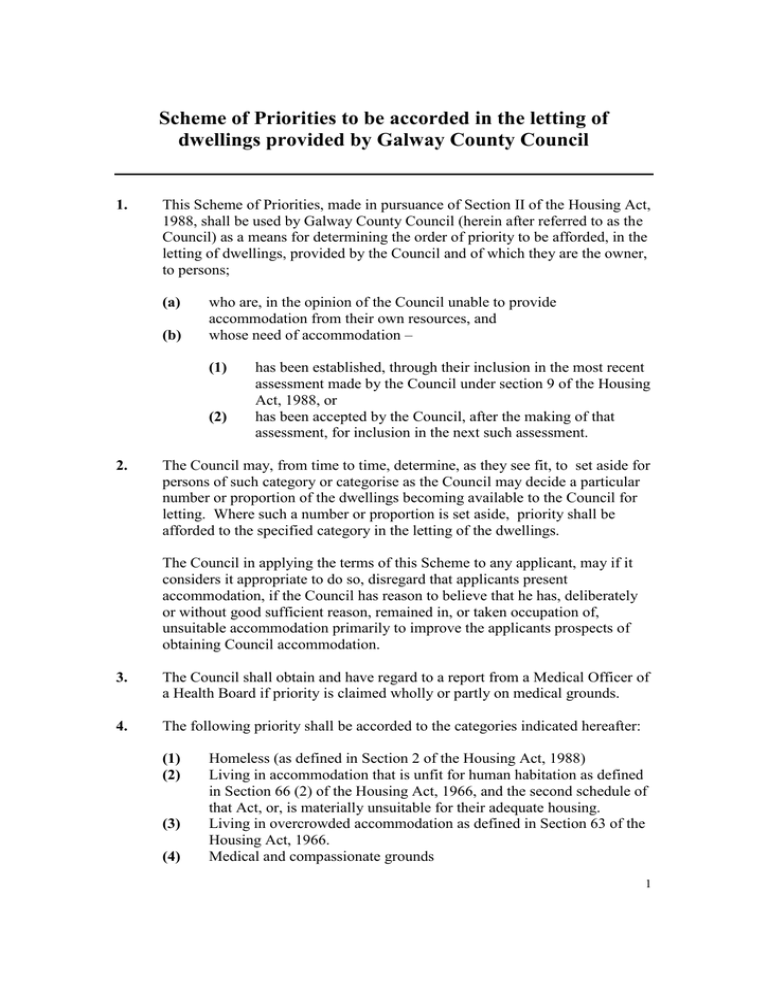Scheme of Priorities to be accorded in the letting of dwellings
advertisement

Scheme of Priorities to be accorded in the letting of dwellings provided by Galway County Council 1. This Scheme of Priorities, made in pursuance of Section II of the Housing Act, 1988, shall be used by Galway County Council (herein after referred to as the Council) as a means for determining the order of priority to be afforded, in the letting of dwellings, provided by the Council and of which they are the owner, to persons; (a) (b) who are, in the opinion of the Council unable to provide accommodation from their own resources, and whose need of accommodation – (1) (2) 2. has been established, through their inclusion in the most recent assessment made by the Council under section 9 of the Housing Act, 1988, or has been accepted by the Council, after the making of that assessment, for inclusion in the next such assessment. The Council may, from time to time, determine, as they see fit, to set aside for persons of such category or categorise as the Council may decide a particular number or proportion of the dwellings becoming available to the Council for letting. Where such a number or proportion is set aside, priority shall be afforded to the specified category in the letting of the dwellings. The Council in applying the terms of this Scheme to any applicant, may if it considers it appropriate to do so, disregard that applicants present accommodation, if the Council has reason to believe that he has, deliberately or without good sufficient reason, remained in, or taken occupation of, unsuitable accommodation primarily to improve the applicants prospects of obtaining Council accommodation. 3. The Council shall obtain and have regard to a report from a Medical Officer of a Health Board if priority is claimed wholly or partly on medical grounds. 4. The following priority shall be accorded to the categories indicated hereafter: (1) (2) (3) (4) Homeless (as defined in Section 2 of the Housing Act, 1988) Living in accommodation that is unfit for human habitation as defined in Section 66 (2) of the Housing Act, 1966, and the second schedule of that Act, or, is materially unsuitable for their adequate housing. Living in overcrowded accommodation as defined in Section 63 of the Housing Act, 1966. Medical and compassionate grounds 1 (5) (6) (7) (8) (9) Elderly persons Disabled or handicapped persons Sharing accommodation with another person or persons and who, in the opinion of the Council, have a reasonable requirement for separate accommodation. Young persons leaving institutional care or without family accommodation In the opinion of the Council, not reasonably able to meet the cost of the accommodation which they are occupying or to obtain suitable alternative accommodation. In the making of the first and any subsequent letting of a dwelling (other than a dwelling referred to in paragraph 2 above) to a person whose need for accommodation has been established through inclusion in an assessment, the Council, shall have regard to the family circumstances, existing accommodation conditions, income and length of time on the assessment list. Notwithstanding the foregoing provisions of the Scheme, the Council shall be entitled to allocate accommodation to a person in need, if such need arises from:(a) An emergency, due to the destruction by fire, collapse or otherwise of their existing accommodation or, (b) 5. other circumstances, that the Council deems to be of such emergency as to warrant rehousing Tenants of the Council dwellings will not normally be considered for transfer to other Council dwellings except under the following circumstances: (1) Overcrowding (2) Where elderly and other small households wish to surrender family type accommodation and move to smaller accommodation (3) Medical/compassionate reasons To qualify for a transfer under the above headings, the following requirements shall be met: (a) (b) (c) (d) (e) (f) Clear rent account. Service and any other charges paid. Have kept their dwelling in a satisfactory manner. Have complied with all conditions of their Letting Agreement. Have no record of serious anti-social behaviour in their present dwelling. Have been tenants of the present dwelling for at least two years. 2 In case of emergency, the foregoing conditions will not apply. Transfers between tenants of the Council and tenants of another housing authority may be permitted provided the conditions agreed between the two authorities for such transfers are met. 6. ANTISOCIAL BEHAVIOUR: An applicant must not have engaged in anti-social behaviour for two clear years before the application is made. Any applicant engaging in anti-social behaviour, after an application is made, will result in the application being removed forthwith from the Housing List. Where the applicant, or member of the applicants’ household, has addressed the issue of anti-social behaviour to the satisfaction of Galway County Council, they will be considered for inclusion on the Housing Waiting List along with all other applicants. In these circumstances an applicant may only reapply when two years have elapsed from the date of their last known episode of anti-social behaviour. For the purposes of the Scheme of Letting Priorities, “anti-social behaviour” has the same meaning as provided in the Housing (Miscellaneous Provisions) Act, 1977. It includes either or both of the following, namely – (a) (b) 7. the manufacture, production, preparation, importation, exportation, sale, supply, possession for the purposes of sale or supply, or distribution of a controlled drug (within the meaning of the Misuse of Drugs Acts, 1977 and 1984), any behaviour which causes or is likely to cause any significant or persistent danger, injury, damage, loss or fear to any person living, working or otherwise lawfully in or in the vicinity of a house provided by a housing authority under the Housing Acts, 1966 to 1997, or a housing estate in which the house is situate and, without prejudice to the foregoing, includes violence, threats, intimidation, coercion, harassment or serious obstruction of any person; FORMER LOCAL AUTHORITY TENANTS Former local authority tenants who reapply for housing and are placed on the housing waiting list, will only be allocated housing if the following conditions are complied with: (a) the rent account on their previous tenancy is clear (b) their compliance, during their previous tenancy, with the County Council’s Letting Conditions was satisfactory (c) all security, cleaning and cost of repairs of any damage done by the former tenant is paid. 3 8. ILLEGAL OCCUPATION OF COUNTY COUNCIL DWELLINGS Galway County Council will take appropriate steps to prevent illegal occupation of County Council dwellings. In the event of illegal occupation, the County Council will take all necessary measures to ensure the removal of illegal occupants. Where an illegal occupant has made an application for housing, the date of application will be adjusted by the period of illegal occupation, and the housing application will not be considered for that period. The allocation of accommodation to a housing applicant who was in illegal occupation of a County Council dwelling will not be considered unless the dwelling is surrendered to the County Council in the same condition it was prior to its illegal occupation. The allocation of accommodation to a housing applicant who was in illegal occupation of a County Council dwelling will not be considered unless the dwelling is surrendered to the County Council in the same condition it was prior to its illegal occupation. Application Details: An applicant must complete in full the application from provided and submit any further information that the Housing Authority may reasonably request for the purposes of assessing the application. The applicant must notify the Housing Department as soon as may be, but not later than 2 weeks after any change in circumstances that might affect his/her eligibility for housing or points awarded. Should an applicant fail to notify the relevant Housing Authority, any offer made or tenancy agreement entered into shall be invalid and the offer withdrawn or the tenancy terminated. An applicant must be resident in the state and have a right to reside in the state, and have attained the age of 18 years at the date of application. An applicant must be incapable, without incurring hardship, of providing accommodation from his/her own resources An applicant whose household income exceeds the income limits set our for Council loans/inclusion in the Shared Ownership Scheme will be deemed to have an adequate income to provide his/her own accommodation. Allowance may be made as follows:(1) Expenses for the full-time minding of children involved in the application (regard being had to any allowance made under Tax Fee Allowance System) (2) Any other special financial circumstances 4 No account will be taken of irregular overtime, bonus, commission and exceptional earnings. 9. GROUNDS FOR REFUSING OR DEFERRING AN OFFER OF ACCOMMODATION Notwithstanding the provisions of the Scheme in regard to an applicant’s entitlement to be considered for accommodation, the Council may in exceptional circumstances refuse to allocate, or defer to allocate a dwelling where it considers the person is or has been engaged in anti-social behaviour, or that a letting to that person would not be in the interest of good estate management. The Council may also refuse to allocate a dwelling in cases where an applicant:(a) refuses to disclose any information which is requested by the County Council either on the application form or at subsequent interviews and which is required either for the purpose of assessing the application or for estate management purposes, (b) will not authorise the provision of data/information on the applicant by other agencies where this data/information is required by the County Council for estate management purposes, or (c) provides false or misleading information either on the application form or at subsequent interviews (Section 33 of the Housing (Miscellaneous Provisions) Act, 1992 provides that an applicant supplying false or misleading information shall be liable on summary conviction to a fine not exceeding £1,000). (d) Where the Local Authority are aware of the following by the applicant/s the application will not be considered for a period of 5 years. (1) (2) (e) (f) caused damage to previous accommodation non payment of any monies due to the Council. Galway County Council will have no obligation to offer accommodation to former tenants of the Council, Tenants of any other Housing Authority or Tenants of any Voluntary Association where they have been evicted following Anti-Social Behaviour activities. Notwithstanding the provision of the scheme in regard to an applicants entitlement to be considered for accommodation the Council may in exceptional circumstances refuse to allocate or defer allocation of a dwelling where it considers that the applicant has been engaged in anti social behaviour or that the letting would not in the interest of good estate management. 5 10. APPLICANTS REFUSING ACCOMMODATION (a) Applicants who refuse an offer of a Local Authority dwelling, suitable for their needs, in their area of first preference, shall not be offered a further tenancy in any area for a period of twelve months. (b) Applicants who refuse a second offer of accommodation in their area of first preferences shall be deferred for a period of 6 months. (c) On the 3rd refusal the applicant shall be deemed to be no longer in need of housing and removed from the list. No further application will be considered from such applicant for a period of 4 years. 11. TRAINING COURSES It is the policy of the County Council that prospective tenants of all accommodation being provided by the County Council will be required to attend a tenant training course on the granting of a tenancy of a dwelling. 12. SUCCESSION TO TENANCY 1. 2. In the event of death in the case of joint tenancy, tenancy will ordinarily be transferred to the surviving tenant or tenants. In the event of death of the joint tenants, tenancy will ordinarily be transferred to the eldest member of the family provided that:(a) that the person is resident and has continued reside in the house throughout his/her lifetime and has been assessed for rent purposes: OR (b) that person having left the house for a period, has been living in the house as a recognised occupant, assessed for rent purposes, for a continuous period of at least 1 year immediately prior to the death of the tenant and is not the owner of other property. Where there are two or more surviving members of the family who meet the criteria at (a) or (b) above, a joint tenancy may be granted by the County Council. 3. Marital Breakdown Legal Separation/Divorce: Where a legal separation agreement/divorce exists, regard will be had by the County Council to the terms of that agreement in the consideration of any application to succession to tenancy. 6 4. Desertion Where there is no legal separation or divorce agreement and where the County Council is satisfied that a spouse has vacated the tenancy for a period of at least two years, the County Council may consider an application for succession of tenancy from the remaining spouse and approve the tenancy if considered appropriate. Where a person other than a spouse is a joint tenant of a dwelling and has not resided in that dwelling for a period of at least two years, the County Council may consider an application for succession from the remaining members of the household and approve the tenancy if considered appropriate. 13. ALTERNATIVE ACCOMMODATION In consultation with the applicant alternative accommodation (non – scheme) will be recommended and provided where this is deemed more suitable including: - 14. Voluntary Housing Semi Supervised Voluntary Housing Rural Purchase House Rural House on Applicants Land Group Housing for Travellers Halting Site Accommodation REFUNDABLE DEPOSIT Applicants will be required to pay a refundable deposit of €600 which will be refunded when the tenant vacates the dwelling provided the dwelling is maintained in a satisfactory condition for a period of five years which ever is the earlier. The deposit will be payable as follows: (1) 15. €200 when tenancy is being allocated and €400 payable by weekly instalments in addition to weekly rent. OVERCROWDING Overcrowding exists where there is a lack of bedroom space. For the purpose of assessing how many bedrooms are required the following table will apply:Family Number Bedroom Requirement Single Person, Cohabiting Couple 1/2 Two Persons not of the same sex and Not living together as a cohabiting Couple 2 7 16. Cohabiting Couple/Lone Parent with 1 or 2 Children 2 Cohabiting Couple/Lone Parent with 3 or 4 Children under 10 yrs 3 UNFIT DWELLING Persons who knowingly take up residence in accommodation which is unfit for human habitation and cannot be made fit at reasonable cost and on which Orders or Notices under Section 66 of the Housing Act, 1966 have been made or served will not be considered for housing accommodation by the Council. 17. FINANCIAL CONTRIBUTION (a) Senior Citizens who are owners of private dwellings and who find that their existing dwelling is too large for their needs may apply to the Council for senior citizen accommodation subject to the payment of a financial contribution, which is set a 1/3 of the nett proceeds of the sale price. However, should the Senior Citizen die or enter a nursing home within 5 years of the tenancy being awarded a refund, in accordance with the table below, will be made to the tenants estate or to the tenant which ever is appropriate. Time as Tenant Less than 1 year 1 year less than 2 years 2 years less than 3 years 3 years less than 4 years 4 years less than 5 years After 5 years Refund 80% refund 60% refund 40% refund 20% refund 10% refund. No Refund Refunds will be calculated on the original contribution made exclusive of any interest that might have accrued. Applicants who apply under this heading must offer their dwelling to the Council for purchase in the first instance. 8


